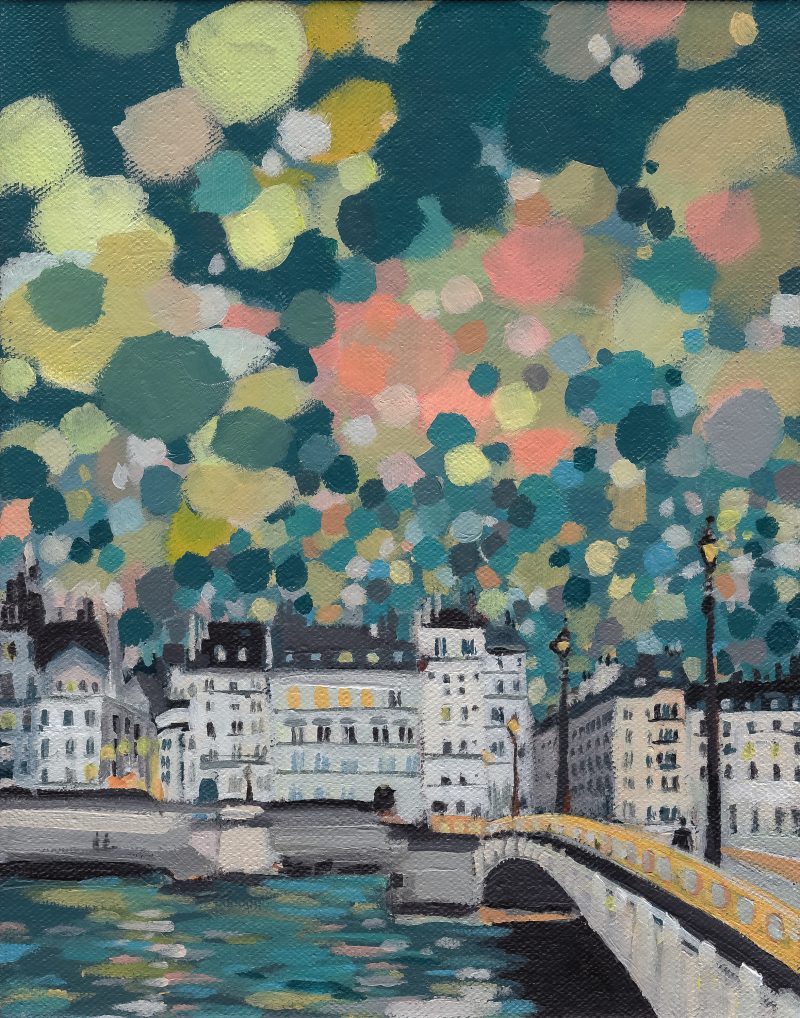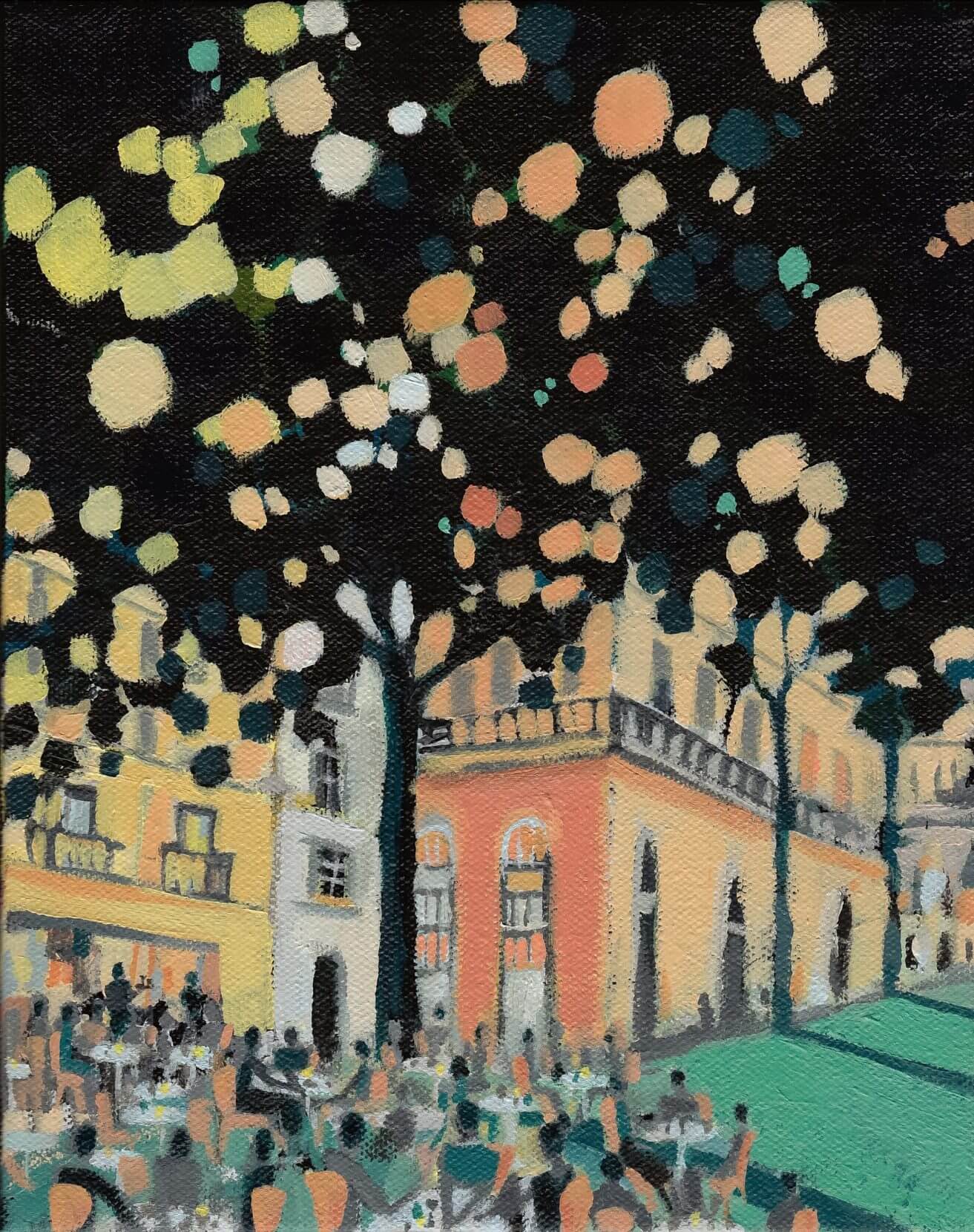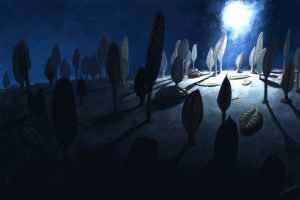LEAVING PARIS (1976)

Painting by Colette Hannahan.
You are going to America
to a land you called home.
You are leaving Paris behind
— the old streets you wandered
as the sun washed the oranges and peaches
and the onions, and the lettuce spilled over the street
where the villagers bellied and prattled and squalled;
the cheap café on Rue de Rivoli
the rich always passed by,
and where you knew a cold beer
and jambon pays salved the worst days;
the foolish weekends on the Normandy beach
where you almost came to believe
your own lies when they lodged deep
in blue eyes and brown skin and blonde hair;
the wise nights when you were alone
and paced the Île Saint-Louis and the Marais
waiting for the glare and hurry of day
to become the cool and lucid green of the platanes.
–
Then there was an older, wiser girl
who you didn’t have to be in love with to enjoy,
and good, passioned politics and arts
whenever you wanted on Rue Montmorency,
and warm, full wine and frites in the Quartier Latin
with all the wild eyes and hands and reeling vows
and the fire-eater cornered by,
but you could get away whenever you wanted
to the Seine and meet new lovers there
— yours and others — and because you were simple
you laughed at good and bad
and even when you were alone
and your footsteps echoed through the streets
everything was all right;
because you were young
and just discovering the world
so even when there was nothing
to be in love with
you loved silence and solitude;
because that was life as it will never be again:
when place and rue whispered only to you
and the dusk-soft lamps took your hand,
when a midnight croissant and beurre in a candled café,
the perfume of dark hair after Musset,
promised a dream without end
— like the first love you lose
forever;
because that was your Paris
and now you are leaving it
like the gray bookstalls on the quai
that holiday no one came:
a beautiful book, your book,
closed
without you.
~~
RETURNING TO PARIS (2018)

Painting by Colette Hannahan.
You have returned to Paris,
to the place that changed your life four decades before.
You have three precious days to find the young you,
so you trace your former ways, making pilgrimages
to the Marais, Notre-Dame, the Musée d’Orsay.
You visit your old neighborhood and sit at a sidewalk café
and marvel at how Paris is so different today:
so many new faces and races in the passing parade.
You spend a long night wandering
the Île Saint-Louis and the Seine,
remembering the demoiselle from Mougins
and the bright-eyed Parisienne,
the first who infatuated you,
the second you opened your heart to.
You remember the lost American sisters
you guided back to the Ritz,
and how their parents presented a dizzying gift
— dinner at La Tour d’Argent
and stage-side seats at the Folies Bergère,
how possibility beckoned everywhere
that summer of endless walks and talks and seaside ease,
lamplit nights and youthful dreams.
Then you were restless,
wondering where life’s path would lead.
Now you have traveled that winding way
— but where has it led, and what does it mean?
On your last night you are determined
to go somewhere suffused with past sense.
But as you enter the cobbled,
tree-shaded Place du Marché Sainte-Catherine,
cast in the grainy gloaming, you find a Renoir scene:
a dozen tables with patrons exclaiming, laughing, and toasting,
calling for more Champagne, more fromages, more escargots.
Impetuously you take a seat,
order a kir royale and savor the tableau.
The couple on your left celebrate the resurgence of the revolution,
the foursome in front ardently debate cinema’s evolution,
and all around the air sings
with the merits of this Bordeaux and that rosé,
the proper way to prepare poulet,
the best beach for next Sunday.
One kir royale leads to another,
and you ask the waitress Virginie for a pitcher of rosé
and her recommendation for an entrée.
The tables around erupt with advice
— the charcuterie, the paté,
“You must try the duck Parmentier!”
Eventually you order frites and faux-filet.
“Bravo!” your neighbors say,
and you are swept on a wave of bonhomie,
suddenly sailing a conversational sea
— French and American politics,
immigration, climate change, the allure of Paris:
“son histoire, sa beauté!”
After two hours, the film critics rise and nod au revoir,
and the regulars clap you on the back and proclaim
“A la prochaine fois!” — “See you again!” — as they leave.
Now you sit alone, willing the night not to end,
and Virginie brings you a complimentary pear digestif.
You take a grateful sip and suddenly
you understand the gift of this journey —
that summer four decades ago, these past three days.
You open your journal and scribble away:
This is to be young — whatever your age — and in Paris,
to immerse yourself in a celebration of life, art, light, sensuality,
elegance, intelligence, beauty, and philosophy.
Sitting in this enchanted place, in this enchanted city,
I am filled with one more Parisian epiphany:
There is no young me
out there waiting to be claimed.
I am the young me;
we are one and the same.
He has always been here,
and always will be —
deeply alive and in Paris, just as Paris
is deeply alive
and in me.
Don George
Author of "The Way of Wanderlust: The Best Travel Writing of Don George," and of "How to Be a Travel Writer," the world's bestselling travel writing guide, Don George is a legendary travel writer and editor. He is currently Editor at Large for National Geographic Travel.



